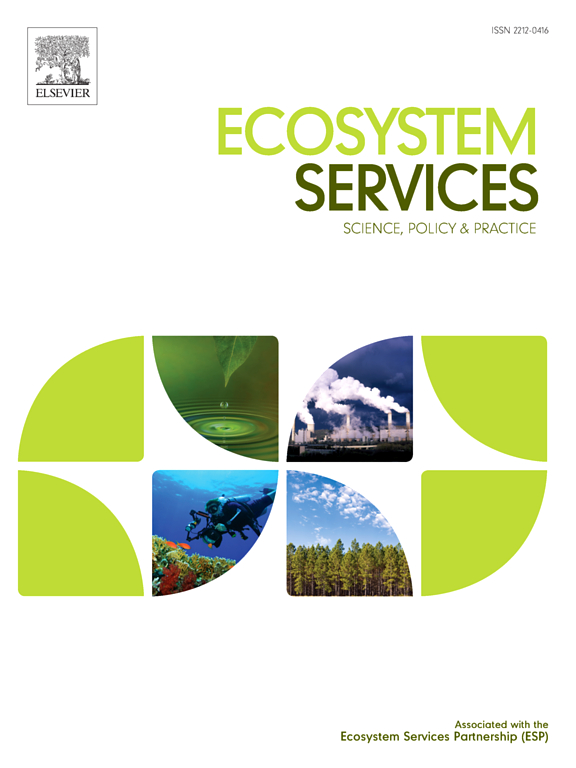Payments for ecosystem services in Mexico: Two decades of progress and challenges between research and practice
IF 6.6
2区 环境科学与生态学
Q1 ECOLOGY
引用次数: 0
Abstract
As some of the world’s largest, longest lasting and most researched initiatives that reward individual and communal landowners for conserving forests and associated ecosystem services, Mexico’s Payments for Ecosystem Services (PES) programmes provide a significant opportunity to examine questions of how, where, and by whom scholarship has been produced and the potential gaps revealed when comparing research insights with implementation patterns. To address these questions, we assembled the most up-to-date and comprehensive database of PES peer-reviewed publications and programme data in a single country. Our study includes a systematic analysis of relevant scientific literature in English and Spanish through 2022 (N = 140) and an assessment of the spatial and temporal distribution, timing, focus, and scope of all federally funded PES programmes at national, subnational, and local levels between 2003 and 2022. We find that variations in the spatial coverage of programme implementation have been associated with proportional levels of research interest over time and that studies represent multiple themes, spatiotemporal scales, and disciplinary and methodological approaches. With some variation, there is congruence among research findings that programmes have produced mostly positive ecological effects and mixed social effects. However, research has been disproportionately concentrated in specific geographic regions and Mexican scholarship has had considerably less global visibility and impact than European and U.S.-based research. By focusing our analysis on PES research and practice within a country-specific context and including literature produced in the local language, our analysis provides greater nuance than previous PES reviews regarding how knowledge is produced and by whom. We identify permanence of programme effects in Mexico as a key emerging issue for future research and, at a global scale, for the need to conduct such nuanced and inclusive assessments of other specific PES programmes to help identify and address key drivers of knowledge gaps in incentive-based environmental policies.
墨西哥生态系统服务的支付:二十年的进展和研究与实践之间的挑战
作为世界上规模最大、持续时间最长、研究最多的一些奖励个人和集体土地所有者保护森林和相关生态系统服务的举措,墨西哥的生态系统服务支付(PES)计划提供了一个重要的机会,可以研究奖学金是如何、在哪里、由谁产生的,以及在比较研究见解与实施模式时发现的潜在差距。为了解决这些问题,我们在一个国家建立了最新和最全面的PES同行评议出版物和规划数据数据库。我们的研究包括到2022年(N = 140)对英语和西班牙语相关科学文献的系统分析,以及对2003年至2022年间所有联邦资助的国家、次国家和地方各级PES项目的时空分布、时间、重点和范围的评估。我们发现,随着时间的推移,项目实施的空间覆盖范围的变化与研究兴趣的比例水平有关,研究代表了多个主题、时空尺度、学科和方法方法。虽然有一些差异,但研究结果一致认为,方案产生的主要是积极的生态影响和混合的社会影响。然而,研究不成比例地集中在特定的地理区域,墨西哥奖学金的全球知名度和影响力远远低于欧洲和美国的研究。通过将我们的分析重点放在特定国家背景下的PES研究和实践上,并纳入以当地语言编写的文献,我们的分析在知识如何产生和由谁产生方面提供了比以前的PES评论更细微的差别。我们将墨西哥项目效果的持久性确定为未来研究的一个关键新兴问题,并且在全球范围内,需要对其他具体的PES项目进行这种细致和包容性的评估,以帮助确定和解决基于激励的环境政策中知识差距的关键驱动因素。
本文章由计算机程序翻译,如有差异,请以英文原文为准。
求助全文
约1分钟内获得全文
求助全文
来源期刊

Ecosystem Services
ECOLOGYENVIRONMENTAL SCIENCES&-ENVIRONMENTAL SCIENCES
CiteScore
14.90
自引率
7.90%
发文量
109
期刊介绍:
Ecosystem Services is an international, interdisciplinary journal that is associated with the Ecosystem Services Partnership (ESP). The journal is dedicated to exploring the science, policy, and practice related to ecosystem services, which are the various ways in which ecosystems contribute to human well-being, both directly and indirectly.
Ecosystem Services contributes to the broader goal of ensuring that the benefits of ecosystems are recognized, valued, and sustainably managed for the well-being of current and future generations. The journal serves as a platform for scholars, practitioners, policymakers, and other stakeholders to share their findings and insights, fostering collaboration and innovation in the field of ecosystem services.
 求助内容:
求助内容: 应助结果提醒方式:
应助结果提醒方式:


